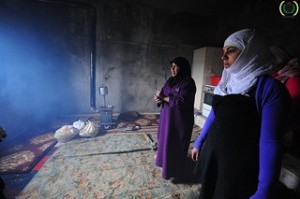The Reproductive Rights of Refugees
Sep 5th, 2012 | By admin | Category: Reproductive Rights/Women's RightsBy Suzanne York, www.howmany.org.
As the fighting and political crisis in Syria escalates, the number of people fleeing the turmoil also increases. Nearly 130,000 people have fled Syria and taken refuge in neighboring countries since the conflict began. Globally, the UN estimates that for any crisis situation, one in five women of childbearing age is likely to be pregnant, making delivery of emergency reproductive care a critical need for refugees.
The majority of those fleeing Syria (and most any war-affected zone) will be women and children, as the men often stay behind to fight. Displaced women, like all women, deserve to have their reproductive rights upheld, no matter the situation.

photo:IHH Humanitarian Relief Foundation/Turkey
http://www.flickr.com/photos/ihhinsaniyardimvakfi/7003160591/
It’s rarely part of any major news story, but female refugees in Syria and in all conflict zones desperately need reproductive health care, from comprehensive family planning support to emergency contraception to maternal health services and proper clinics for childbirth. And refugees are at greater risk of complications with pregnancies (including unattended deliveries). They also face high rates of gender-based violence.
According to the Reproductive Health Response in Crises Consortium, the consequences of insufficient reproductive health care in emergencies may include:
- Unplanned and unintended pregnancies due to lack of family planning;
- Death and permanent disability of women and girls due to lack of emergency obstetric care in response to complications of pregnancy and childbirth;
- Life-threatening complications from unsafe abortions, which are due to unplanned and unintended pregnancies, compounded by lack of post-abortion care;
- Risk of HIV infection and other sexually transmitted infections transmitted infections due to lack of condoms and condom education;
- Lack of response for gender-based violence – the use of rape as a weapon of war; the coercion of women and girls to provide sex in exchange for basic necessities; and the risk of attackson women and girls who must travel long distances for firewood and other supplies.
The Women’s Refugee Commission states that women and adolescent girls in refugee and internally displaced settings struggle with unwanted, unplanned and poorly spaced pregnancies; this is often due to the act of access to counseling, contraceptives and information. Not being able to access family planning threatens their lives and the well-being of their families.
According to the United Nations High Commissioner for Refugees (UNHCR), “Reproductive healthcare should be available in all situations and be based on the needs and expressed demands of refugees, particularly women, with full respect for the various religious and ethical values and cultural backgrounds of the refugees while also conforming with universally recognized international human rights.”
Reproductive health and rights are also acknowledged under international agreements. The 1994 International Conference on Population and Development, known as the Cairo Agenda, recognized the reproductive health needs of refugees and displaced people as a human right. The Millennium Development Goals – though refugees are not specifically mentioned – include reproductive health components in four of the ten goals, including promoting gender equality, reducing child mortality, improving maternal health and slowing the spread of HIV/AIDS.
The United Nations Population Fund (UNFPA) is attempting to meet the demand for women’s health services, working with Syrian refugees in the neighboring countries in which they have settled. In Lebanon, UNFPA is distributing reproductive health kits (defined by the World Health Organization as containing essential drugs, supplies, and equipment to be used for a limited period of time; see this manual for full details)and supplies to medical centers, and also organizing trainings for health care workers on how to prevent and manage sexual violence, HIV transmission, and prevent maternal morbidity. In Jordan, a “women-only” examining room was secured, after many Syrian women voiced concern on being seen by male doctors.
The World Health Organization states that people in good reproductive health, including the forcibly displaced, should be provided “the capability to reproduce and the freedom to decide if, when and how often to do so.” The global community should ensure that refugee women and girls are provided the care they need, and support the rights that they deserve and are entitled to, for the duration of their displacement and beyond – hopefully settled safely back in their homelands.
Suzanne York is a senior writer with the Institute for Population Studies/HowMany.org
